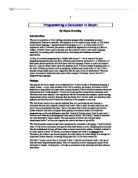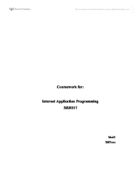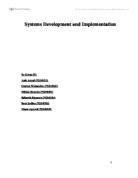t++;
}
}while(dictionary[dic].word!="" && main!=dic);
if(t==0)
{
dictionary[dic].word=word;
dictionary[dic].defList.insertAtHead(def);
}
}
}
List LinHTable::get(string w)
{
int key=HashVal(w);
while(dictionary[key].word!=w)
{
key++;// key is represents increment to be used .
}
return dictionary[key].defList;
}
void LinHTable::traverse()
{
//displaying word and defini
for(int h=0 ;h<TABLE_SIZE; h++)
{
if(dictionary[h].word!="")
{
cout<<dictionary[h].word<<": "<<endl;
get(dictionary[h].word).printList();
cout<<endl;
}
}
}
// to search , it will display the search word
void LinHTable::search(string str)
{
int inc=0;
for(int key=0 ; key<TABLE_SIZE; key++)
{//hash function to calculate the table index for search key.
if(dictionary[key].word==str)
{
get(str).printList();
inc++; // inc is represents increment to be used .
}
}
if (inc==0)
cerr<<"Word Not found!"<<endl;
}
//remove word from table
//void LinHTable::remove(string word)
//{
// int location = hashVal(word);
// dictionary[location].word = "";
// dictionary[location].defList.clear();
//}
//Main.cpp
#include<iostream>
#include <string>
#include<fstream>
#include "LinHTable.h"
using namespace std;
struct Def
{
char definition[1000];// get definition from the file defs.dat
char inDefin[1000];//getting users inputs
}HaFile[TABLE_SIZE];
string wrd[TABLE_SIZE]; //get the word from defs.dat file
string Inwrd; // getting user input word
int Caline=0; //count number of words in the dictionary
// sort the word in alphabetical order
void bubbleSort(string arr[],int size)
{
int i, j;
string temp;
for(i=size-1;i>0;i--)
{
for(j=0;j<i;j++)
{
if(arr[j]>arr[j+1])
{
temp=arr[j];
arr[j]=arr[j+1];
arr[j+1]=temp;
} //end if
} //end for
} //end for
} //end BubbleSort
void option(){ //options for seletion
cout<<"\n\n\t $$$####**** WELCOME TO DICTIONARY ****####$$$\n"<< endl;
cout<<"\t .*********************************. "<<endl;
cout<<"\t # * * #"<<endl;
cout<<"\t # * 1. Display The Directory * #"<<endl;
cout<<"\t # * 2. Search your word * #"<<endl;
cout<<"\t # * 3. Sorted your dictionary * #"<<endl;
cout<<"\t # * 4. Inserting new word * #"<<endl;
cout<<"\t # * 5. Close the Dictionary * #"<<endl;
cout<<"\t # * * #"<<endl;
cout<<"\t *********************************"<<endl;
}
//convert to lowercase
void toLower(basic_string<char>& s)
{
for (basic_string<char>::iterator p = s.begin( );
p != s.end( ); ++p)
{
*p = tolower(*p);
}
}
//check the word
bool charchk(string str) //check the word is valid or not .
{
int cha=0;
char alp[]={'a','b','c','d','e','f','g','h','i','j','k',
'l','m','n','o','p','q','r','s','t','u','v','w','x','y','z'};// makes an array for 26 elements to insert alphabetics
for(int c=0 ; c<=str.length() ; c++)
{
for(int Def=0 ; Def<=25 ; Def++)
if(str[c]==alp[Def])
{
cha++;
}
}
if(cha==str.length())
return true;
else
return false;
}
void readDicf(LinHTable& b)
{
//geting the lines of file
ifstream data("defs.dat");
if(!data.is_open())
{
cerr<<"Unable to open the file!!"<<endl;
exit (1);
}
//Read the data from defs.dat file
while(!data.eof())
{
for(int rd=0 ; rd<TABLE_SIZE ; rd++)
{
data>>wrd[rd];
data.getline(HaFile[rd].definition,1000,'\n');
if(charchk(wrd[rd]))
b.put(wrd[rd],HaFile[rd].definition);
if(wrd[rd]!="")
Caline++;
//reading & saving the string to list of the file
}
}
data.close();
}
//Display the dictionary
void displayAll(LinHTable& da)
{
da.traverse();
}
// search the word from the hash table
void Searchwd(LinHTable& da)
{
cout<<"Enter the word you want to search : ";
cin>>Inwrd;
toLower(Inwrd); //convert to lowercase
da.search(Inwrd); //check the word
}
bool twd(string w1, string w2)//check the word to word .
{
if(w1==w2)
{
return false; // if word to word equal then return false
}
else // if not return true
return true;
}
//sorting the dictionary
void sortString(LinHTable& Ss)
{
bubbleSort(wrd,Caline);
for(int rd=0 ; rd<Caline; rd++)
{
if(charchk(wrd[rd]))
{
if(twd(wrd[rd],wrd[rd+1]))
{
cout<<wrd[rd]<<endl;
Ss.get(wrd[rd]).printList();
cout<<endl;
}
}
}
}
//insert new word & definition into the list
void insert()
{
cout<<"Enter the word you want to add : ";
cin>> Inwrd;
cin.ignore();
cout<<"Enter the Definition for the word(end with [.]) : ";
cin.getline(HaFile[0].inDefin, 1000, ' . ');
toLower(Inwrd); // converting user input to lowercase
ofstream wri("defs.dat");
for(int d=0; d<Caline; d++)
{
wri<<wrd[d];
wri<<HaFile[d].definition<<endl;
}
wri<<Inwrd;
wri<<" "<<HaFile[0].inDefin<<"."<<endl;
cout<<"You inserted word successfully"<<endl<<endl;
}
int main()
{
LinHTable ht;
readDicf(ht);
char menu;
option(); //call the option method
do{
cout<<endl<<"Enter your choice[1-5]: ";
cin>>menu;
cout<<endl<<endl;
if(!( menu=='1' ||menu=='2' ||menu=='3'||menu=='4'||menu=='5'))
{
cerr<<"Invalied choice, Please enter between[1-5]"<<endl;
}
if(menu=='1')
{
displayAll(ht);
option(); //call the option method
}
else if(menu=='2')
{
Searchwd(ht);
option(); //call the option method
}
else if(menu== '3')
{
sortString(ht);
option(); //call the option method
}
else if(menu=='4')
{
insert();
option(); //call the option method
}
}while(menu!='5');
cout<<"\t\t\t------Thank you ----\n";
cout<<"\t\t---------------*******----------------\n";
return 0;
}
Assumptions
void Option()
I create this function for options. There will display 5 options for user needs
void LinHTable::traverse()
here display the perfect dictionary there words are ordered by alphabetical order I call sorting function there for this purpose . There I used Bubble sort for this sorted function.
void sortString(LinHTable& Ss)
here the words are sorted as alphabetical order & I used bubble Sort method for sort the strings.Here the bubble sort check elements in array and get the first letter from the word and sorted as alphabetical order.
void insert()
Here insert word & definition inside the hash table before insertion it will check the empty table & put word and definition there & its check the word, That if its already there,then again insert word & definition different places. But when we are searching in the run program, there show only one word and many definitions.
List LinHTable::get(string w)
here the list of definition associated with key word return null list if word is not present in the table.So list is return.
int HashVal(string str)
Here I declare an array of alphabets (a-z) for hash function. The hash function will get the string, and in the for loop it will get the value or each letter and add into “variable n”, After getting the total of “variable n” I divide that by table size and taking the reminder, then the num will not exist the table limit 29.
References
Recipe 4.12. Converting a String to Lower- or Uppercase
example 4-20. Converting a string's case
C++ Cookbook
By Jeff Cogswell, Christopher Diggins, Ryan Stephens, Jonathan Turkanis
Publisher: O'Reilly
Pub Date: November 2005
ISBN: 0-596-00761-2
STUDENT B-
INDEPENDENT REHASHING TECHNIQUE
CODING
As a group, we created the Definition.cc and List.cc files together.
Definition.h
//Definition.h
#ifndef Definition_h
#define Definition_h
#include <string>
#include <cstdlib>
using namespace std;
class Definition
{
public:
Definition(); //constructor (initialisation)
~Definition();
//setter methods
void setDefinition(string def);
void setNext(Definition*);
//getter methods
string getDefinition();
Definition* getNext();
private:
string definition;
Definition* next;
};
#endif
Definition.cc
#include "Definition.h"
#include <string>
#include <cstdlib>
#include <iostream>
using namespace std;
Definition::Definition()
{
definition = "NULL";
next = NULL;
}
Definition::~Definition()
{
}
void Definition::setDefinition(string def)
{
definition=def;
}
void Definition::setNext(Definition* n)
{
next=n;
}
string Definition::getDefinition()
{
return definition;
}
Definition* Definition::getNext()
{
return next;
}
For my part, I have edited the List class to accommodate a few functions, that I require in my part. They have been included below:
List.h
//List.h
// Student: Malshani Nanayakkara
// Stu_No: 2007020
#ifndef List_h
#define List_h
#include <string>
#include "Definition.h"
using namespace std;
class List
{
public:
List(); //constructor - initialise empty list
~List(); //destructor
Definition* getHead();
string getList();
//inserts definition at the front of the list
void insertH(string definition);
void insertR(string definition);
//whether list is empty
bool isEmpty() const;
//display the list contents
void printList() const;
void printListToFile() const;
private:
Definition* head; //points to head of list
};
#endif
List.cc
//List.cc
// Student: Malshani Nanayakkara
// Stu_NO: 2007020
#include "Definition.h"
#include "List.h"
#include <stddef.h>
#include <iostream>
#include <fstream>
using namespace std;
//constructor - initialises empty list
List::List()
{
head = NULL;
}
List::~List()
{
Definition* current;
Definition* i;
i = head;
while (i != NULL)
{
current = i;
i = i->getNext();
delete current;
}
}
Definition* List::getHead()
{
return head;
}
string List::getList()
{
string output, z;
string blank="\n";
Definition* n = NULL;
for ( n=head; n!=NULL; n = n->getNext() )
{
output += blank + n->getDefinition(); //display data value
//return string(n->getDefinition());
//cout << n->getDefinition() << endl;
}
//free(n);
return output;
}
bool List::isEmpty() const
{
return head==NULL;
}
void List::insertH(string definition) //inserts node at head
{
Definition* n = new Definition;
n->setDefinition(definition);
n->setNext(head);
head = n;
}
void List::insertR(string definition) //inserts node at rear
{
Definition* n = new Definition; //new node
n->setDefinition(definition);
n->setNext(NULL);
Definition* current; //node to traverse the list
current = head; //start at beginning of list
while(current->getNext()!=NULL)
{
current = current->getNext();
}
current->setNext(n); //sets last node to point to the new node;
}
void List::printList() const
{
if ( isEmpty() )
{
cout << "The List is empty" << endl;
}
else
{
Definition* n = NULL;
for ( n=head; n!=NULL; n = n->getNext() )
{
cout << "\t" << n->getDefinition() << endl; //display data value
}
cout << endl;
}
}
void List::printListToFile() const
{
ofstream writefile("dict.dat", ios::app);
if(!(isEmpty() ))
{
Definition* n = NULL;
for ( n=head; n!=NULL; n = n->getNext() ) {
//display data value
writefile <<"\t"<< n->getDefinition() << endl;
}
}
writefile.close();
}
As I have changed the List.cc file, my test class has also changed so that I could test this new function.
List_test.cc
//List_test.cc
// Student: Malshani Nanayakkara
// Stu_NO: 2007020
#include <iostream>
#include <stddef.h>
#include <fstream>
#include "List.h"
using namespace std;
int main()
{
List l;
l.insertH("hello");
l.insertH("world");
l.insertH("good bye");
l.insertR("tata");
cout <<"\nCalling printlist() function: " << endl;
l.printList();
cout <<"\nCalling getlist() function:" << endl;
cout << "1" << l.getList() <<endl<<endl;
ofstream write("test.txt");
write << "List items:\n" << endl;
write << l.getList() << endl;
write << "End of File! "<< endl;
write.close();
List l2; //empty list
l2.printList();
}
Included below is my IndepHTable files:
IndepHTable.h
//IndepHTable.h
// Student: Malshani Nanayakkara
// Stu_NO: 2007020
#ifndef IndepHTable_h
#define IndepHTable_h
#include <string>
#include "List.h"
const int TABLE_SIZE = 29;
using namespace std;
class IndepHTable
{
public:
IndepHTable(); //constructor - create empty table
~IndepHTable(); //destructor
//enter data into table
void load_dict();
void put (string word, string def);
void add(string, string);
void sort_arr(int);
//return the list of definition(s) associated with 'word'
int getIndex(string);
List get(string word);
//void get(string word);
//display non-empty hash entries
void print();
bool valid(string);
int hash(string, char);
private:
struct
{
string word;
List defList;
}dictionary[TABLE_SIZE];
};
#endif
IndepHTable.cc
//IndepHTable.cc
// Student: Malshani Nanayakkara
// Stu_NO: 2007020
#include "IndepHTable.h"
#include <string>
#include <fstream>
#include <iostream>
#include <algorithm>
#include <cstdlib>
using namespace std;
//constructor
IndepHTable::IndepHTable()
{
dictionary->word="";
}
IndepHTable::~IndepHTable()
{
}
//to load dictionary
void IndepHTable::load_dict()
{
ifstream readfile ("dictionary.txt");
string word, line;
if (readfile.is_open())
{
while (!readfile.eof() )
{
readfile >> word;
getline (readfile,line);
put(word, line);
}
readfile.close();
}
else
cout << "Unable to open dictionary file"<<endl;
}
bool IndepHTable::valid(string word)
{
char word_arr[20]; //assuming longest word is less than or equal to 20 characters
strcpy(word_arr, word.c_str() ); //converts string to char array
int sz = strlen(word_arr); //gets the number of characters in the array
int flag = 0;
for (int i=0; i<sz; i++) {
if (! ((word_arr[i]>=65 && word_arr[i]<=90) || (word_arr[i]>=97 && word_arr[i]<=122)) ) //checks if character is either an upper case or lower case letter
flag=1; //an invalid character has been entered}
}
if (flag==0)
return true;
else
return false;
}
//returns the index for the hash table
int IndepHTable::hash(string word, char option)
{
char word_arr[20]; //assuming longest word is less than or equal to 20 characters
int hash_index=0, rehash_inc=0, total=0;
strcpy(word_arr, word.c_str() ); //converts string to a char array
int sz = strlen(word_arr); //gets the number of characters in the array.
for (int i=0; i<sz; i++) {
total += (int)word_arr[i]; //gets the ASCII equivalent and sums up all the characters' values
}
if (option=='h')
{
hash_index = total % TABLE_SIZE; //calculates hash index using the division-remainder technique
//cout << word << " " << "index: " << hash_index << endl;
return hash_index;
}
else if (option=='r')
{
rehash_inc = total % 23; //calculates the increment for rehashing by division-remainder technique with the next smallest prime number
if (rehash_inc==0) //since increment value can not be value, it is made to one.
rehash_inc = 1;
return rehash_inc;
}
}
void IndepHTable::put(string word, string def) //adds word to hash table
{
if(valid(word)) //checks whether word contains any non-alphabetic characters
{
int index = hash(word, 'h');
int increment = hash(word, 'r');
int flag = 0; //flag to indicate whether word has been added to hash table or not. flag=0, means its not added.
do{
if ( dictionary[index].word=="" || word.compare(dictionary[index].word)==0 ) { //if the slot is empty OR if the the same word is already stored at that index
dictionary[index].word = word;
dictionary[index].defList.insertH(def);
flag = 1;
}
else { //different word is stored in the index so index is changed by adding increment.
index += increment;
if (index>=TABLE_SIZE) //checks if index is out of table range
index -= TABLE_SIZE;
}
} while (flag==0);
}
else
cout << " Error: The word " << word << " is invalid! Can not be added to dictionary" << endl;
}
void IndepHTable::add(string new_word, string new_def)
{
if(valid(new_word)) {
put(new_word, new_def);
ofstream writefile ("dictionary.txt",ios::app);
writefile << "\n" << new_word << " " << new_def;
writefile.close();
}
else
cout << "The word " << new_word << "is invalid! " << endl;
}
void IndepHTable::sort_arr(int option)
{
string arr[TABLE_SIZE];
int sz =TABLE_SIZE;
List result;
int x;
for (int i=0; i<TABLE_SIZE; i++) {
arr[i] = dictionary[i].word;
}
sort(arr, arr+sz);
if (option==0)
{
//writes to file dict.dat
ofstream writefile ("dict.dat");
for (int j=0; j < TABLE_SIZE; j++)
{
if (arr[j]!="")
{
//get index of where the word is stored in the hash table
x = getIndex(arr[j]);
writefile << "\n" << arr[j] << " : "<< dictionary[x].defList.getList()<<"\n";
}
}
writefile.close();
cout << "\nThe Dictionary has been written to dict.dat file..." <<endl;
}
else
{
for (int k=0; k < TABLE_SIZE; k++)
{
if (arr[k]!="")
{
//get index of where the word is stored in the hash table
x = getIndex(arr[k]);
cout<< "\n" << arr[k] << " : "<< dictionary[x].defList.getList()<<"\n";
}
}
}
}
int IndepHTable::getIndex(string findword)
{
//linear search in hash table
int index;
for (int i=0; i< TABLE_SIZE; i++)
{
if(findword.compare(dictionary[i].word)==0)
{ index = i; }
}
return index; //as words are taken from the dictionary and then sorted, an index will always be returned.
}
List IndepHTable::get(string searchword)
{
//search hash table for 'word' and return list of definitions
List result;
if (valid(searchword))
{
int index = hash(searchword, 'h');
int increment = hash(searchword, 'r');
int count = 0;
while ( (searchword.compare(dictionary[index].word)!=0 ) && (count<TABLE_SIZE) ) //exits loop if word is found
{
index += increment; //increments index to next location
if (index>=TABLE_SIZE) //checks if index is out of table range
index -= TABLE_SIZE;
count++; //counts the number of records that have been traversed. if it is equal to TABLE_SIZE, all records in hash table has been traversed!
}
if(searchword.compare(dictionary[index].word)==0 )
{
result = dictionary[index].defList;
//result.printList();
}
}
else
cout << "The search word you have entered contains non-alphabetic characters and is incorrect!" << endl;
return result;
}
void IndepHTable::print()
{
for (int i=0; i<TABLE_SIZE; i++)
{
if (dictionary[i].word!="") {
cout << dictionary[i].word << " :\n";
dictionary[i].defList.printList(); //prints out list
}
}
}
This file contains the menu and is equivalent of a main.cc file.
Indep_test.cc
//Indep_test.cc
// Student: Malshani Nanayakkara
// Stu_NO: 2007020
#include <iostream>
#include <fstream>
#include "IndepHTable.h"
using namespace std;
int main()
{
IndepHTable Dict;
char exit;
Dict.load_dict(); //loads dictionary
do{
//MENU
cout << endl<<endl;
cout << "\t/-------------------------------------------------------\\"<<endl;
cout << "\t|\t DICTIONARY\t\t\t|"<<endl;
cout << "\t\\-------------------------------------------------------/"<<endl<<endl;
cout << "Menu options: "<< endl;
cout << "\n1) Display Dictionary";
cout <<" \n2) Search For A Word";
cout << "\n3) Add A New Word To Dictionary";
cout << "\n4) View Sorted Dictionary";
cout << "\n5) Write Dictionary To File";
cout << "\n6) Exit\n "<< endl;
cout << "Please enter your selection: " ;
int option;
cin >> option;
if (option==1)
{
cout << "\n\t---------------DISPLAY DICTIONARY---------------"<<endl;
Dict.print();
}
else if (option==2)
{
//search and retrieves definitions for a given word
cout << "\n\t---------------SEARCH FOR A WORD---------------"<<endl;
string searchword;
List defns;
cout << "Enter search word : ";
cin >> searchword;
cout << "\nResults:" <<endl;
cout << "\n" << searchword << " : ";
Dict.get(searchword).printList();
}
else if (option==3)
{
cout << "\n\t----------------ADD NEW WORDS----------------"<<endl;
string new_w;
string new_d;
cout << "Enter a new word : " ;
cin >> new_w;
cin.get(); //get the 'enter' key press
cout << " Enter its definition: " ;
getline(cin, new_d);
Dict.add(new_w, new_d);
cout << "\nWord has been added! "<< endl;
}
else if(option==4)
{
cout << "\n\t---------------SORTED DICTIONARY---------------"<<endl;
Dict.sort_arr(1);
}
else if(option==5)
{
Dict.sort_arr(0);
}
else
{
if (option!=6)
{
cout << "Invalid menu option!"<< endl;
}
}
cout << "\n Do you wish to exit the dictionary application?(y/n) :" ;
cin >> exit;
}while (exit=='n'|| exit=='N');
cout << "\nExiting..." << endl;
return 0;
}
TESTING
Testing part
Student A
SCREEN SHOTS –STUDENT A
Welcome to Dictionary
Screen shot 1
Screen shot 2
Screen shot 3
Screen shot 4
Screen shot 5
Screen shot 6
Screen shot 7
Screen shot 8
Screen shot 9
Student B
SCREEN SHOTS – STUDENT B
Test 1
Test 2
Test 3
Test 4
Test 5
Test 6
Test 7
Test 8
Test 9
In order to show that the word has been added, I displayed the dictionary in the next screenshot
Test 10
Test 11
Test 12
EVALUATION
Individual Statements- Self-Evaluation
Student A
Student B







